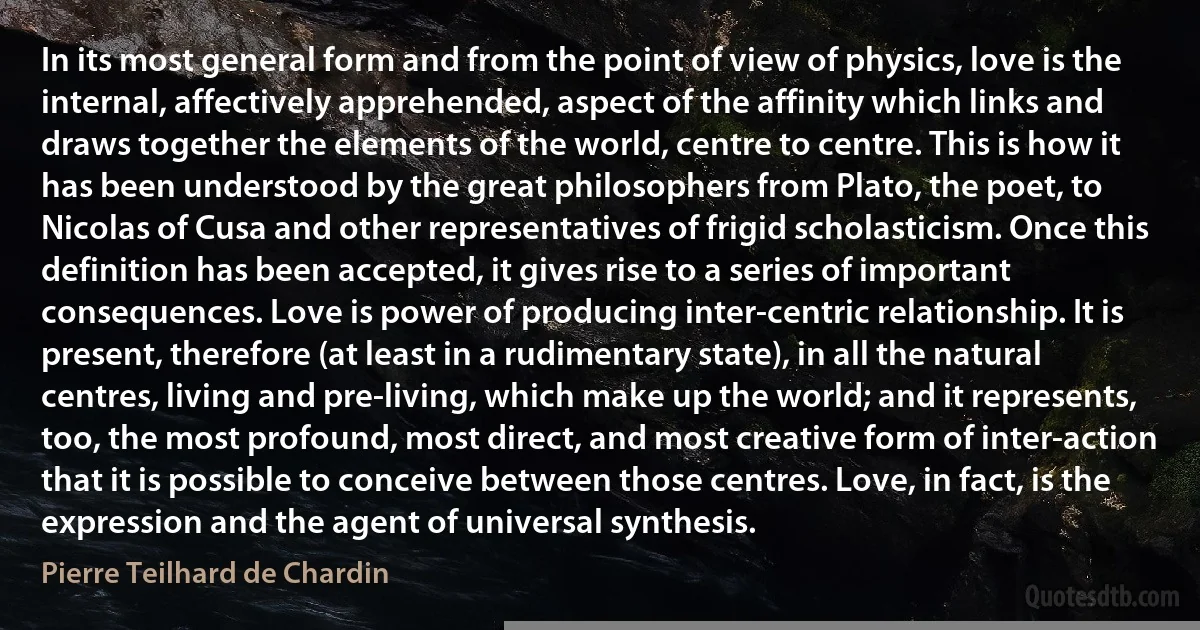
In its most general form and from the point of view of physics, love is the internal, affectively apprehended, aspect of the affinity which links and draws together the elements of the world, centre to centre. This is how it has been understood by the great philosophers from Plato, the poet, to Nicolas of Cusa and other representatives of frigid scholasticism. Once this definition has been accepted, it gives rise to a series of important consequences. Love is power of producing inter-centric relationship. It is present, therefore (at least in a rudimentary state), in all the natural centres, living and pre-living, which make up the world; and it represents, too, the most profound, most direct, and most creative form of inter-action that it is possible to conceive between those centres. Love, in fact, is the expression and the agent of universal synthesis.
Pierre Teilhard de ChardinRelated topics
agent aspect creative definition form general gives great least living love natural once point possible power present rise rudimentary series state synthesis universal view world linksRelated quotes
I am convinced our own happiness requires that we should continue to mix with the world, and to keep pace with it as it goes; and that every person who retires from free communication with it is severely punished afterwards by the state of mind into which he gets, and which can only be prevented by feeding our sociable principles. I can speak from experience on this subject. From 1793 to 1797 I remained closely at home, saw none but those who came there, and at length became very sensible of the ill effect it had on my own mind, and of its direct and irresistible tendency to render me unfit for society and uneasy when necessarily engaged in it. I felt enough of the effect of withdrawing from the world then to see that it led to an anti-social and misanthropic state of mind, which severely punishes him who gives in to it; and it will be a lesson I never shall forget as to myself.

Thomas Jefferson
In art, origin and value cannot be treated as independent. Those who enjoy poetry and painting must be at least dimly aware of a poet beyond the poem and a painter beyond the picture. If by some unimaginable process works of beauty could be produced by machinery, as a symmetrical colour pattern is produced by a kaleidoscope, we might think them beautiful till we knew their origin, after which we should be rather disposed to describe them as ingenious. And this is not, I think, because we are unable to estimate works of art as they are in themselves, not because we must needs buttress up our opinions by extraneous and irrevelant considerations; but rather because a work of art requires an artist. not merely in the order of natural causation, but as a matter of a-sthetie necessity. It conveys a message which is valueless to the recipient, unless it be understood by the sender. It must be expressive.

Arthur Balfour
The absolute rights of man, considered as a free agent, endowed with discernment to know good from evil, and with power of choosing those measures which appear to him to be most desirable, are usually summed up in one general appellation, and denominated the natural liberty of mankind. This natural liberty consists properly in a power of acting as one thinks fit, without any restraint or control, unless by the law of nature: being a right inherent in us by birth, and one of the gifts of God to man at his creation, when he endowed him with the faculty of freewill. But every man, when he enters into society, gives up a part of his natural liberty, as the price of so valuable a purchase; and, in consideration of receiving the advantages of mutual commerce, obliges himself to conform to those laws, which the community has thought proper to establish.

William Blackstone
In order that woman should reach the same standard as man, she ought, when nearly adult, to be trained to energy and perseverance, and to have her reason and imagination exercised to the highest point; and then she would probably transmit these qualities chiefly to her adult daughters. The whole body of women, however, could not be thus raised, unless during many generations the women who excelled in the above robust virtues were married, and produced offspring in larger numbers than other women. As before remarked with respect to bodily strength, although men do not now fight for the sake of obtaining wives, and this form of selection has passed away, yet they generally have to undergo, during manhood, a severe struggle in order to maintain themselves and their families; and this will tend to keep up or even increase their mental powers, and, as a consequence, the present inequality between the sexes.

Charles Darwin
Now let us regard the idea of God from the magic standpoint, according to the four elements,the so-called tetragrammaton, the unspeakable, the supreme: the fiery principle involves the almightiness and the omnipotence, the airy principle owns the wisdom, purity and clarity, from which aspect proceeds the universal lawfulness. Love and eternal life are attributed to the watery principle, and omnipresence, immortality and consequently eternity belong to the earth principle. These four aspects together represent the supreme Godhead. Let us tread upon this path to this supreme Godhead practically and step by step, beginning from the lowest sphere, to arrive at the true realization of God in ourselves. Let us praise the happy man who will reach this still in his earthly existence. Us banish fear of the pains, for all of us will reach this goal.

Franz Bardon
